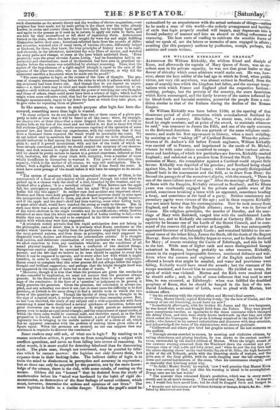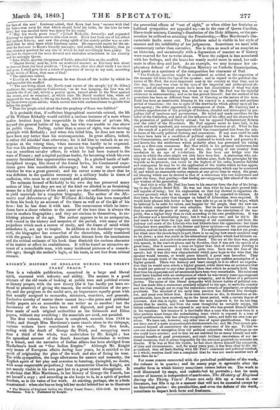SIR WILLIAM KIRKALDT OF GRANGE.* ALTHOUGH Sir William Kirkaldy, the
whilom friend and disciple of Knox, and afterwards the captain of Mary Queen of Soots, was an ex- cellent man in his private capacity, he was not that great leader or that flower of chivalry which some admirers would make out. He was, how- ever, about the best soldier of the bad age in which he lived, when public virtue, not very rife anywhere, was almost extinct in Scotland, from the state of anarchy into which the kingdom had fallen, and the corrupt temp- tations with which France and England plied the respective factions : nothing, perhaps, but the poverty of the country, the stern fanaticism which Knox encouraged, and the hardy bravery of the nation inflamed by its blood-feuds and baronial enmities, preserved the people' from a con- dition similar to that of the Italians during the decline of the Roman Empire.
Sir William Kirkaldy was born before 1530, at the opening of that disastrous period of civil contention which overshadowed Scotland for more than half a century. His father, "a stoute man, who always of by single combats, and at point of the sword, to maintain whatever he said," was treasurer to James the Fifth, and one of the early converts to the Reformed doctrines. His son partook of the same religions senti- ments; and made his first appearance in history, when a mere stripling, by assisting at the " taking off" of Cardinal Beaton. When the palace- fortress of St. Andrew's fell before French engineers, William Kirkaldy was carried off to France, and imprisoned in the castle of' St. Michel ; whence he with some others contrived to escape. After various adven- tures and hardships, of which few particulars are known, Kirkaldy reached England ; and subsisted on a pension from Edward the Sixth. Upon the accession of Mary, the conspirator against a Cardinal could expect little favour. Kirkaldy was deprived of his pension ; and Scotland being closed against him, he took service in France; where he so greatly distinguished himself both in the tournament and the field, 83 to draw from Henry the Second the panegyric of the monstrari digito, with the remark, " There is one of the most valiant men of our age." After the marriage of Mary Queen of Scots with the Dauphin, Kirkaldy returned to Scotland; and for fifteen years was continually engaged in the private and public wars of the period, sometimes breaking a lance with an opponent, sometimes heading a foray, and sometimes at the head of a party. Neither consistency nor pecuniary purity were virtues of the age ; and in these respects Kirkaldy was not much better than his contemporaries. Now he took money from England, and was for the English alliance; anon, he was in favour of Frauce. His religious principles, the murder of Darnley, and the mar- riage of Mary with Bothwell, ranged him with the confederated Lords against her, and to Kirkaldy she surrendered at Carberry Hill. After her captivity he became one of the Lords of the Secret Council, and in com- mand of the reserve did good service at Langside. He was subsequently appointed Governor of Edinburgh Castle; and remained faithful to the no- minal cause of the infant King, James the Sixth, till the death of the Regent Murray. Soon after that, his fidelity began to waver, and he finally declared for Mary ; of course retaining the Castle of Edinburgh, and this he held to the last. While men of higher rank and more distinguished lineage submitted to Morton, having probably no other resource, Kirkaldy, secure in the supposed impregnable fortress, continued defiance and war. Even when the cannon and engineers of the English auxiliaries had effected a breach that might be assailed, and water and provisions were failing, Kirkaldy would have stood the assault ; but the remnant of his troops mutinied, and forced him to surrender. - He yielded on terms, the spirit of which was violated. Morton and the Kirk were resolved that he should suffer ; and, in spite of some influence that was used to save him, he was executed, at Edinburgh : when was fulfilled the deathbed prophecy of Knox, that he should be banged in the face of the sun. David Lindesay, a minister of Leith, went to plead with Morton, but
without effect.
" Oa his returning with the rejected offers and Morton's final answer, " Then, Master David;replied Kirkaldy firmly, for the love of Christ, and the memory of our old friendship, do not leave me now !' .
"Immediately afterwards, with his brother Sir James and the two burgesses, he was bound with cords and brought forth from the Palace. They were placed upon conspicuous hurdles, as spectacles to the dense concourse which thronged the Abbey Close, and thus were slowly drawn backwards up that long and steep street called the Canongate. The pious Lindesay remained m the hurdle of Kir- kaldy ; who listened to his earnest exhortations and discourse with deep attention, and acknowledged the value of his ministrations with sincere gratitude.
"Calderwood and others give brief but graphic notices of his last moments on the scaffold.
" Through streets crowded to excess, by scowling and vindictive citizens, by railing churchmen and pitying loyalists, he was drawn to the ancient market- cross, surrounded by the mailed soldiers of Morton. When the bright sunset of the summer evening streamed from the Westward down the crowded and pic- turesque vista of that noble and lofty street, and when he saw the day faire and the sunne shyning cleere' on the vast Gothic façade of St. Giles, the high fantastic gable of the old Tolbooth, grisly with the bleaching skulls of traitors and the grim arm of the fatal gibbet, with its cords dangling near the tall octagon co- lumn and carved battlements of the cross, then his countenance changed,' and so markedly that Lindesay asked why.
"' In faith ! 'Master David,' he replied, 'now I well perceive that Master Knox was a true servant of God, and that his warning is about to be accomplished. Repeat unto me his last words.'
" The minister then rehearsed Knox's prediction, which was in every man's mouth and in all men's memory.. ' The soul of that man,' Knox said, is dear to me; I would fain have saved him; but he shall be dragged forth and hanged in • Memoirs and Adventures of Sir William Kirkaldy of Grange, Knight, 8rc. tsc. rut- ltsbed by Blackwood and Sons. the face of the sun.' Lindesay added, that Knox had been earnest with God for him—was sorry fur that which should befal his bodie, for the lova he bore him; but was assured there was mercy fer his soule. May his words prove true!' rTened Kirkaldy, fervently; and requested Lindesay to repeat them over to him once more. Knox had been one of his oldest and earliest friends; and now the strong spirit of the stately.aoldier was so sub- dued that he shed tears while Lindesay spoke. He expressed regret for the an- swer he had sent to Knox's friendly .message ; and added, with humility, that he was sincerely penitent for any sins of which he had unwittingly been guilty. To the last he expressed the most devoted and unshaken attachment to his country and its unhappy Queen.
"John Done, another clergymari of Leith, attended him on the scaffold.
" master David,' said he, with an unaltered manner, as Lindesay was about to descend from the fatal platform, I hope that, after men shall think I am dead and gone, I shall give them a token of assurance of mercy to my soul, according to the words of Knox, that man of God.' " The ministers retired.
Exactly at four in the afternoon he was thrust off the ladder by which he bad ascended the scaffold. " The sun being about the North-west corner of the steeple,' (of St. Giles,) continues the superstitious Calderwood, as he was hanging, his face was set towards the East, but, within a prettie space turned about to the West against the sense, and so remained; at which time 'Mr. David marked him, when all supposed he was dead, to lift up his hands, which were bound before him, and to lay them down again sofilie; which moved him with exclamstioune to glorifie God before the people.'
" Then the people cried aloud that the prophesy of Knox was fulfilled."
It is probable that, if sufficient biographical materials existed, the life of Sir William Kirkaldy would exhibit a curious instance of a man whose native instinct kept him respectable in the relations of private life, beyond the general habits of his age, but who was unable to rise above its public vices. Feeling, rather than a sense of right, was the moving principle with Kirkaldy ; and when this failed him, he does not seem to have been any better than his contemporaries. In great affairs, indeed, it rather did mischief than otherwise; for it led him to embark in an en- terprise at the wrong time, when success was hardly to be expected. Nor was his military character so great as his biographer assumes. He was an excellent cavalry officer, to which he had been trained in the wars of France ; and a capital partisan leader, for becoming which his own country furnished him opportunities enough. In a pitched battle of half- disciplined troops, like those of the feudal levies, his Continental expe- rience gave him considerable advantage; but it may be questioned whether he was a great general; and his career seems to show that he was deficient in the qualities necessary to a military leader in times of confusion, who must be at once captain and politician.
The estimate formed of Kirkaldy in his own day has preserved many notices of bina ; but they me not of the kind we alluded to as furnishing means for a full picture of his mind ; nor are they sufficiently continuous to yield materials for' a complete biography. The author of the Me- moirs and Adventures qf Sir William Kirhaldy has been compelled to form his book by an account of the times as well as of the life of his hero : but be has done it with tact. The occurrences which he intro- - duces have a closer relation to the career of the hero than is always the case in modern biographies ; and they are curious in themselves, as ex- hibiting pictures of the age. The author appears to be an antiquarian, well versed in the history and memoirs of the period, with many of the prejudices which such a course of study, and the frame of mind which stimulates it, are apt to inspire. In addition to the laudator temparis acti, the biographer has somewhat of the rhetorician, oddly combined with the gossip : but these qualities rather detract from the conclusions and the critical estimate of his book than diminish the curious character of its matter or affect its readableness. It will be found an attractive an- count of a remarkable man, with many incidental pictures of a remark- able age; though the author's logic, or his taste, is not free from critical censure.



























 Previous page
Previous page